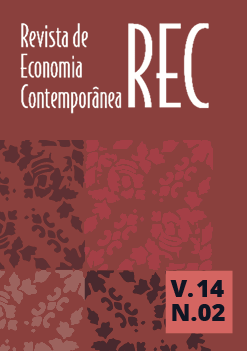DOS CLÁSSICOS AOS HEREGES: KEYNES E A ECONOMIA DE SEU TEMPO // FROM THE CLASSICAL TO THE HERECTICS: KEYNES AND THE ECONOMICS OF HIS DAY
Palavras-chave:
demanda efetiva, ciclos econômicos, equilíbrio agregado, economia keynesiana // effective demand, business cycles, aggregate equilibrium, Keynesian economicsResumo
RESUMO: O artigo trata da posição teórica de Keynes relativamente à economia clássica e à abordagem denominada herética. A primeira seção resgata os traços distintivos das escolas clássica e neoclássica segundo a demarcação proposta por Keynes, bem como as críticas por ele dirigidas às principais teses defendidas por essas linhagens teóricas. A seguir, retoma-se a sua avaliação dos argumentos subconsumistas, indicando-se os seus pontos de convergência e distanciamento dessa visão econômica. Na continuação, apresentam-se as interpretações neoclássicas ao problema da demanda, comentando-se a relação da obra de Keynes com a tradição marshalliana. A última seção avalia a teoria neoclássica do produto real sob condições cíclicas e introduz a versão de Keynes para o equilíbrio agregado defi nido pelas propensões a gastar e a investir, além de indicar o componente de fragilidade da leitura marshalliana de sua estrutura teórica. Por fi m, comenta-se a contribuição de Keynes ao conhecimento econômico da época perante a escola clássica e os hereges.
ABSTRACT: This paper deals with Keynes’ theoretical stance toward both classical economics and the so-called heretic approach. The first section delineates the distinctive traces of the classical and the neoclassical schools according to Keynes’ criteria, as well as his critique of the main theses advanced by these theoretical lineages. Next, it presents his evaluation of the main underconsumptionist arguments, indicating his points of convergence to and contention with this economic vision. After that, the neoclassical analyses of the demand puzzle are retrieved, along with some observations on the relation of Keynes’ work with the Marshallian tradition. The last section evaluates the neoclassical theory of aggregate output under cyclical conditions and introduces Keynes’ version for the aggregate equilibrium defined from the propensities to spend and to invest, pointing out also the fragility of the Marshallian interpretation of his theoretical structure. Eventually, it comments on Keynes’ contribution to the economic knowledge of the time with regard to the classical and the heretic schools.
Downloads
Publicado
Edição
Seção
Licença
Todo el contenido se publica bajo una licencia Creative Commons CC-BY, salvo que se indique lo contrario.


